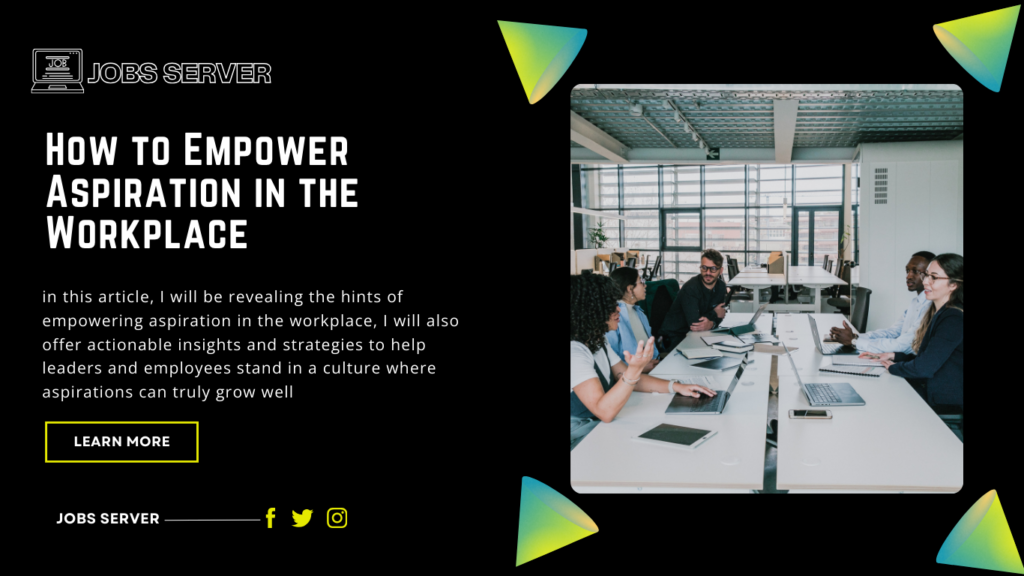How to Empower Aspiration in the Workplace
INTRODUCTION
In today’s environment of present workspaces, employees’ aspirations often fuel innovation and drive business success. Yet, nurturing these aspirations isn’t just about dangling a carrot of promotion or offering occasional praise. It requires a deeper, more intentional approach. one that aligns the organization’s goals with individual ambitions. In this article, I will be revealing the hints of empowering aspiration in the workplace, I will also offer actionable insights and strategies to help leaders and employees stand in a culture where aspirations can truly grow well.
WHAT IS ASPIRATION IN THE WORKPLACE?
Aspiration in the workplace refers to the deep, personal drive that motivates you to achieve more than just immediate goals, like promotions or salary increases. It’s about envisioning a future where your work aligns with your values, passions, and long-term ambitions. Unlike specific, time-bound goals, aspirations guide your overall career journey, influencing decisions and daily actions. This concept is crucial for professional development as it helps you find purpose in your work, drives continuous growth, and ultimately leads to a more fulfilling and impactful career.
UNDERSTANDING ASPIRATION IN THE WORKPLACE
Aspiration in the workplace is more than just career goals or personal development plans; it’s the basic motivation that propels individuals to grow, innovate, and contribute meaningfully to their organization. Aspiration is the fuel that keeps employees engaged, inspired, and willing to go the extra mile. It’s about wanting more not just in terms of salary or title, but in terms of purpose, impact, and personal fulfillment.
I once worked at a company where aspiration was more of a buzzword than a reality. The leadership team would talk about growth opportunities during annual meetings, but day-to-day, the environment was boiling. Employees were boxed into unbending roles, and any attempt to step out of those boxes was met with resistance. It was then I realized that true empowerment of aspiration requires a supportive environment, where individuals feel safe and encouraged to pursue their goals, no matter how unconventional they may seem. 
THE ROLE OF LEADERSHIP IN EMPOWERING ASPIRATION
Leaders play a crucial role in cultivating an environment where aspirations are nurtured. But this goes beyond offering promotions or monetary rewards. It involves understanding the unique aspirations of each team member and creating pathways for them to explore and achieve their goals. Two things you should do as a leader….
· Active Listening and Open Communication
Empowerment starts with listening. Leaders must be approachable and genuinely interested in their team’s aspirations. Regular one-on-one meetings where employees can discuss their goals, concerns, and ideas are essential. However, it’s not just about listening; it’s about creating action plans that align these aspirations with organizational objectives. For instance, if a team member is passionate about sustainability, finding ways to incorporate that into their current role can significantly boost their engagement and satisfaction.
· Mentorship and Skill Development
Aspirations often require new skills or knowledge. Leaders should adopt a culture of continuous learning by offering access to training, workshops, and mentorship programs. But instead of a one-size-fits-all approach, these opportunities should be tailored to individual needs. A marketing professional with aspirations in digital strategy should be encouraged to attend advanced analytics courses or be paired with a mentor who excels in that area.
In my previous role, I was fortunate to have a manager who recognized my interest in content strategy, even though my job was primarily focused on social media management. She introduced me to a mentor within the company who was a seasoned content strategist. This connection not only helped me acquire new skills but also broadened my perspective on my career path. This experience taught me the value of personalized mentorship in empowering aspirations.
1. CREATING A CULTURE THAT FOSTERS ASPIRATION
Empowering aspiration requires more than just leadership intervention; it demands a cultural shift within the organization. A culture that raises aspiration is one where innovation, creativity, and growth are not just encouraged but embedded in the company’s DNA. As a leader, to create a culture that fosters aspirations has to do with……….
· Encourage Innovation And Creativity
Creativity should not be confined to the creative department. All employees, regardless of their role, should feel empowered to share ideas and think outside the box. This can be facilitated through brainstorming sessions, innovation labs, or even casual “idea days” where employees are free to explore new concepts without the pressure of immediate results. Celebrating successes, as well as learning from failures, is critical in maintaining a creative and aspirational culture.
· Recognize And Celebrate Achievements
Recognition is a powerful motivator, and it doesn’t always have to come in the form of awards or bonuses. Simple acknowledgments, such as a shutout during meetings, a personalized note, or even a mention in the company newsletter, can go a long way in making employees feel valued and motivated to pursue their aspirations. It’s about making people feel seen and appreciated for their contributions, no matter how small.
I recall a time when I submitted a proposal that wasn’t selected for a project. Instead of dismissing it, my manager took the time to provide constructive feedback and shared it with the team as an example of innovative thinking. Although the proposal didn’t move forward, the recognition I received for my effort boosted my confidence and encouraged me to keep pushing boundaries.
2. PROVIDE GROWTH OPPORTUNITIES
Growth opportunities are not limited to climbing the corporate ladder. They can also include lateral moves, special projects, or roles in cross-functional teams. Employees who feel stuck in their current position may lose their drive, but offering them new challenges can reignite their aspirations. Whether it’s leading a new initiative or participating in a task force, these opportunities allow employees to grow in ways that align with their aspirations.
In one of my roles, I noticed a colleague who was excellent at project management but felt unfulfilled in her current position. After expressing her desire for more responsibility, she was offered the chance to lead a cross-departmental project. This not only enhanced her skills but also opened new doors for her career. It was a win-win situation where the organization benefited from her expertise, and she felt empowered to pursue her aspirations.
THE EMPLOYEE’S ROLE EMPOWERING SELF-ASPIRATION
While leadership and organizational culture are vital, employees also have a responsibility to empower their aspirations. Self-awareness, proactivity, and a willingness to step out of comfort zones are essential components of personal empowerment.
1. SET CLEAR GOALS
Employees should take the time to define their aspirations clearly. Vague goals like “I want to be successful” or “I want to grow” are difficult to pursue. Instead, specific, measurable, achievable, relevant, and time-bound (SMART) goals can provide a clear roadmap. For instance, if an employee aspires to move into a leadership role, they should outline the skills and experiences needed to achieve that goal and work with their manager to develop a plan.
2. SEEK FEEDBACK AND ACT ON IT
Feedback is a valuable tool for growth. Employees should actively seek feedback from peers, mentors, and managers, and be open to constructive criticism. More importantly, they should act on the feedback received. This might involve taking on new challenges, improving certain skills, or adjusting their approach to work. Feedback is not just about correcting mistakes; it’s about recognizing strengths and identifying opportunities for further development.
3. EMBRACE CONTINUOUS LEARNING
The world of work is constantly evolving, and employees who embrace lifelong learning are better equipped to adapt and grow. Whether it’s through formal education, online courses, or learning from peers, continuous learning is key to staying relevant and pursuing aspirations. Employees should actively seek out opportunities to learn and grow, whether it’s through attending industry conferences, joining professional networks, or simply reading up on the latest trends in their field.
HOW TO OVERCOME CHALLENGES TO ASPIRATION IN THE WORKPLACE?
Empowering aspiration is not without its challenges and barriers. Organizational politics, limited possessions, or a lack of support can delay even the most driven individuals. However, these obstructions can be overcome with persistence, creativity, and the right strategies.
HOW TO OVERCOME CHALLENGES
- Employees should build strong networks, By aligning their goals with the organization’s objectives and finding allies who can support their aspirations. It’s also important to stay focused on long-term goals and not be discouraged by temporary setbacks.
- Employees should look for alternative ways to achieve their goals, such as leveraging free or low-cost tools, collaborating with others, or finding innovative solutions to resource challenges. Leaders can also support this by providing flexibility and encouraging a resourceful mindset within their teams.
- Sometimes, aspirations may require support beyond what the organization can offer. In such cases, employees should seek external mentorship, join professional organizations, or even pursue personal projects that align with their goals. External support can provide fresh perspectives, new opportunities, and additional resources to help employees achieve their aspirations.
FINAL THOUGHT
It is very important to know that empowering aspiration in the workplace is a dynamic and multifaceted process that requires commitment from both leaders and employees. By fostering a supportive environment, offering growth opportunities, and encouraging continuous learning, organizations can create a culture where aspirations are not only encouraged but are actively pursued and realized. In turn, employees who take ownership of their aspirations, seek out growth opportunities, and navigate challenges with resilience are more likely to achieve their goals and contribute meaningfully to their organization.
We should know that empowerment is not a one-time event but an ongoing journey. It’s about creating a workplace where every individual feels valued, motivated, and equipped to turn their aspirations into reality. By doing so, organizations can unlock the full potential of their teams, driving innovation, growth, and success for all.
SOME ASKED QUESTIONS ON HOW TO EMPOWER ASPIRATION IN THE WORKPLACE
- What are effective ways to empower employees’ aspirations in the workplace?
Empowering employees’ aspirations starts with open communication. Leaders should encourage discussions about personal and professional goals during one-on-one meetings. Provide opportunities for growth through training programs, mentorship, and challenging projects that align with their aspirations.
- How can leaders support employees’ career aspirations?
Leaders can support employees’ career aspirations by offering personalized development plans. This involves identifying each employee’s strengths and career goals, then tailoring opportunities that help them advance
- Why is it important to nurture aspiration in the workplace?
Nurturing aspiration in the workplace is crucial for maintaining high levels of motivation and job satisfaction. When employees feel that their personal and professional growth is valued, they are more likely to stay engaged and committed to their work.
- What role does company culture play in empowering workplace aspirations?
Company culture plays a significant role in empowering workplace aspirations by setting the tone for how growth and ambition are viewed
- How can regular feedback sessions empower employee aspirations?
Regular feedback sessions are essential for empowering employee aspirations as they provide a structured opportunity to discuss progress, set new goals, and address any challenges
- How do mentorship programs contribute to empowering aspirations in the workplace?
Mentorship programs are a powerful tool for empowering aspirations as they connect employees with experienced professionals who can offer guidance, advice, and support
- Can flexible work arrangements help in empowering aspirations?
Yes, flexible work arrangements can significantly empower aspirations by allowing employees to manage their time better and pursue personal and professional development opportunities
- How can organizations measure the success of empowering aspirations in the workplace?
Organizations can measure the success of empowering aspirations through employee satisfaction surveys, retention rates, and performance metrics.
- What challenges might arise when trying to empower aspirations in the workplace?
One of the main challenges in empowering aspirations is balancing individual goals with the company’s needs
- How can continuous learning and development empower workplace aspirations?
Continuous learning and development empower workplace aspirations by providing employees with the skills and knowledge needed to achieve their goals.





